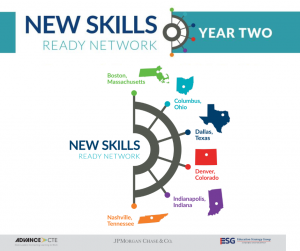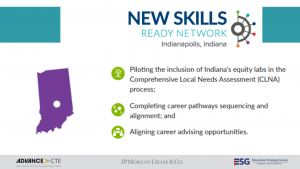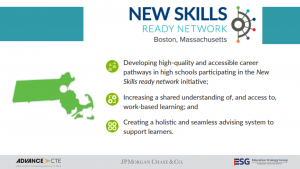 Today, Advance CTE and Education Strategy Group (ESG) released an annual report and site snapshots for year two of the New Skills ready network initiative. The five-year initiative, part of JPMorgan Chase and Co.’s $350 million global New Skills at Work program and $30 billion commitment to advance racial equity, aims to improve student completion of high-quality, equitable career pathways to gain skills needed for the future of work, particularly among learners of color and other historically marginalized learners.
Today, Advance CTE and Education Strategy Group (ESG) released an annual report and site snapshots for year two of the New Skills ready network initiative. The five-year initiative, part of JPMorgan Chase and Co.’s $350 million global New Skills at Work program and $30 billion commitment to advance racial equity, aims to improve student completion of high-quality, equitable career pathways to gain skills needed for the future of work, particularly among learners of color and other historically marginalized learners.
The New Skills ready network focuses on six domestic sites as illustrated in the graphic below. As a partner in this initiative, Advance CTE strives to elevate the role of state capacity and resources in advancing project priorities. Additionally, we have gained a unique perspective on promising practices to strengthen state-local partnerships across the country.
Looking across each of the snapshots, key priorities emerged as trends for the six sites.
 First, many sites continued or finalized the mapping and analysis of career pathways to determine alignment and quality across learner levels. Indianapolis, Indiana, for example, completed their process that was started in year one of evaluating their career pathways against a criteria review tool, which examined access for non-traditional populations, credential attainment, course sequencing, and connection to labor market information, among other criteria. The review also aligned the pathways with the state’s Next Level Programs of Study (NLPS), statewide course sequences which aim to improve consistency, quality, and intentionality of CTE instruction throughout Indiana.
First, many sites continued or finalized the mapping and analysis of career pathways to determine alignment and quality across learner levels. Indianapolis, Indiana, for example, completed their process that was started in year one of evaluating their career pathways against a criteria review tool, which examined access for non-traditional populations, credential attainment, course sequencing, and connection to labor market information, among other criteria. The review also aligned the pathways with the state’s Next Level Programs of Study (NLPS), statewide course sequences which aim to improve consistency, quality, and intentionality of CTE instruction throughout Indiana.
Career advising initiatives were also a major theme for sites in year two, as sites considered how to expand support for learners through a career journey. The Nashville, Tennessee, team prioritized aligned career advising from middle school through postsecondary, with the goal of expanding individualized support. This work, built upon a college and career advising framework developed in year one, was implemented by College and Career Readiness Coaches embedded in select Metro Nashville Public Schools.
 Boston, Massachusetts, set expansion of work-based learning as a key focus for year two, as multiple sites discussed how to align work-based learning efforts across learner levels and open more apprenticeship and virtual learning opportunities. The Boston Private Industry Council, the Workforce Investment Board and Boston Public Schools collaborated to ensure a shared commitment to work-based learning and strengthen data collection efforts surrounding participation in work-based learning. Other sites established common definitions of work-based learning to ensure that all partners were consistent in discussions about access.
Boston, Massachusetts, set expansion of work-based learning as a key focus for year two, as multiple sites discussed how to align work-based learning efforts across learner levels and open more apprenticeship and virtual learning opportunities. The Boston Private Industry Council, the Workforce Investment Board and Boston Public Schools collaborated to ensure a shared commitment to work-based learning and strengthen data collection efforts surrounding participation in work-based learning. Other sites established common definitions of work-based learning to ensure that all partners were consistent in discussions about access.
The snapshots also previewed work for year three of the initiative, as each site recently participated in action planning processes that informed future work. Each site has ambitious goals for year three, largely informed by lessons learned in preceding years. Some sites, like Columbus, Ohio, are continuing communications and messaging work supported by learner-tested messages that seek to inform learners about available career pathways supports and opportunities. Other sites, like Denver, Colorado, are continuing data collection and analysis efforts, finalizing data frameworks, and aligning data systems across institutions. Finally, some sites such as Dallas, Texas, are aligning their efforts with other initiatives in their cities and ensuring that all partners can equitably support learners citywide.
Visit Advance CTE’s New Skills ready network series page to read the full annual report and a snapshot of each site’s innovative partnerships and early accomplishments across the four project priorities. Our New Skills ready network collection page provides additional resources for strengthening career pathways.
Dan Hinderliter, Senior Policy Associate
